ECE Day at I-STEM’s Multidisciplinary Summer Camp: Soldering, Circuits, and Software
October 5, 2017
“The earlier you get exposed, the better you'll be at it…because it's something you've seen before.” —ECE Graduate Student Lonna Edwards
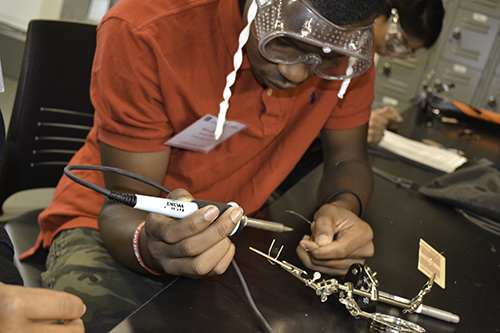
A UHS student learns how to solder.
What is Electrical and Computer Engineering (ECE) anyway? On Thursday, August 10, 27 Urbana High School (UHS) student athletes found out a little about it at the I-STEM Summer Camp’s ECE Day, when ECE’s Lynford Goddard and several students from his lab exposed the campers to some activities related to ECE. Students learned about then did hands-on activities about research experiment design, how to solder, and how to build circuits. In addition to learning about the field, students also interacted with several ECE graduate students and discovered a bit about what being an engineering student might be like.
Goddard began the day by teaching the UHS students what makes a good research experiment and how to design one. He even threw them a curve ball with an LED light research activity where only half of the LEDs would light up to challenge them to trouble shoot. Then, after learning some things about circuits, such as their role and importance in electronics, how they work, and how to build one, the students then proceeded to build one of their own.
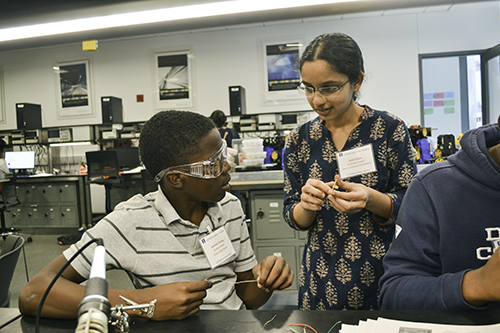
Aditi Udupa, an ECE grad student, coaches a camper through the process of building a circuit.
Key to the circuit-making process was soldering; while a few of the high schoolers had had previous experience soldering, for most, this was the first time they had ever tried it. But after a brief lecture about the specifics, they all eagerly began the activity, and through trial and error, they got the hang of it. According to Aditi Udupa, one of the graduate students in Goddard’s lab, “Most of them are new, but they picked it up very fast. Initially, they were very confused, but considering they didn't have any experience, they were pretty fast to learn it.”
Goddard and his team also exposed the high school students to the other half of ECE: Computer Engineering. So learning to write code to test their circuits was also on the agenda. . In order to make sure their circuits worked, they were taken up to a computer lab. Goddard led the students step by step to create code that would test whether or not their circuits were connected and soldered correctly. Then he used the program to test a few of the circuits they’d just built. Each student also received a copy of the program to take home and experiment with.
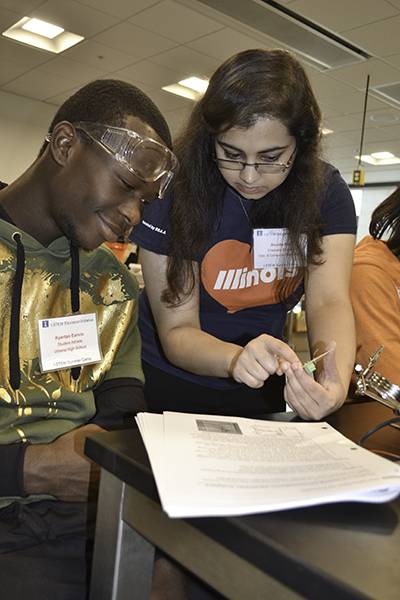
Arunita Kar, an ECE grad student, helps a UHS student doing a hands-on activity.
Why do Goddard and his students take time away from their research to work with high school students? Udupa says outreach events like this one might encourage students to consider college…and to show them that they too can do engineering. She claims the activities can “Get them interested and give them motivation to go to college.” She also says the camp could get them interested in engineering “because they may not know what engineering is about, and they may not know that they can do something like this.” She believes the camp could give them something to get interested in and get started with.
Udupa claims she also got involved because her mentor, Goddard, is really passionate about outreach, “So I think I took some of that, and I like to teach specifically, so this is a good way to get some experience.”
Another of Goddard’s graduate students, Arunita Kar, who’s just finishing up her Masters' and will soon begin her PhD, reports that the benefit of bringing high school kids into a lab like this is “mainly the exposure.” She indicates that when she was growing up, anytime someone said electrical engineering, she thought of not just circuits, but trains and things like that.
“But here, she explains, “not only do you get circuits, but you get photonics and optics, and you get to see the whole convergence of all of those many different things that all rely on electricity and electrical engineering and electronics. So it's really nice.”
Regarding the day’s hands-on activities, Kar says, “Getting an early start like the things they're doing in these projects like soldering and programming are really useful later on in life, and I wish I had had these opportunities.”
Another grad student from Goddard’s lab, Lonna Edwards, (who was also involved in four other camps this past summer), indicates that, like Kar, she participates in outreach events like ECE Day because it’s something she didn’t have access to at that age.
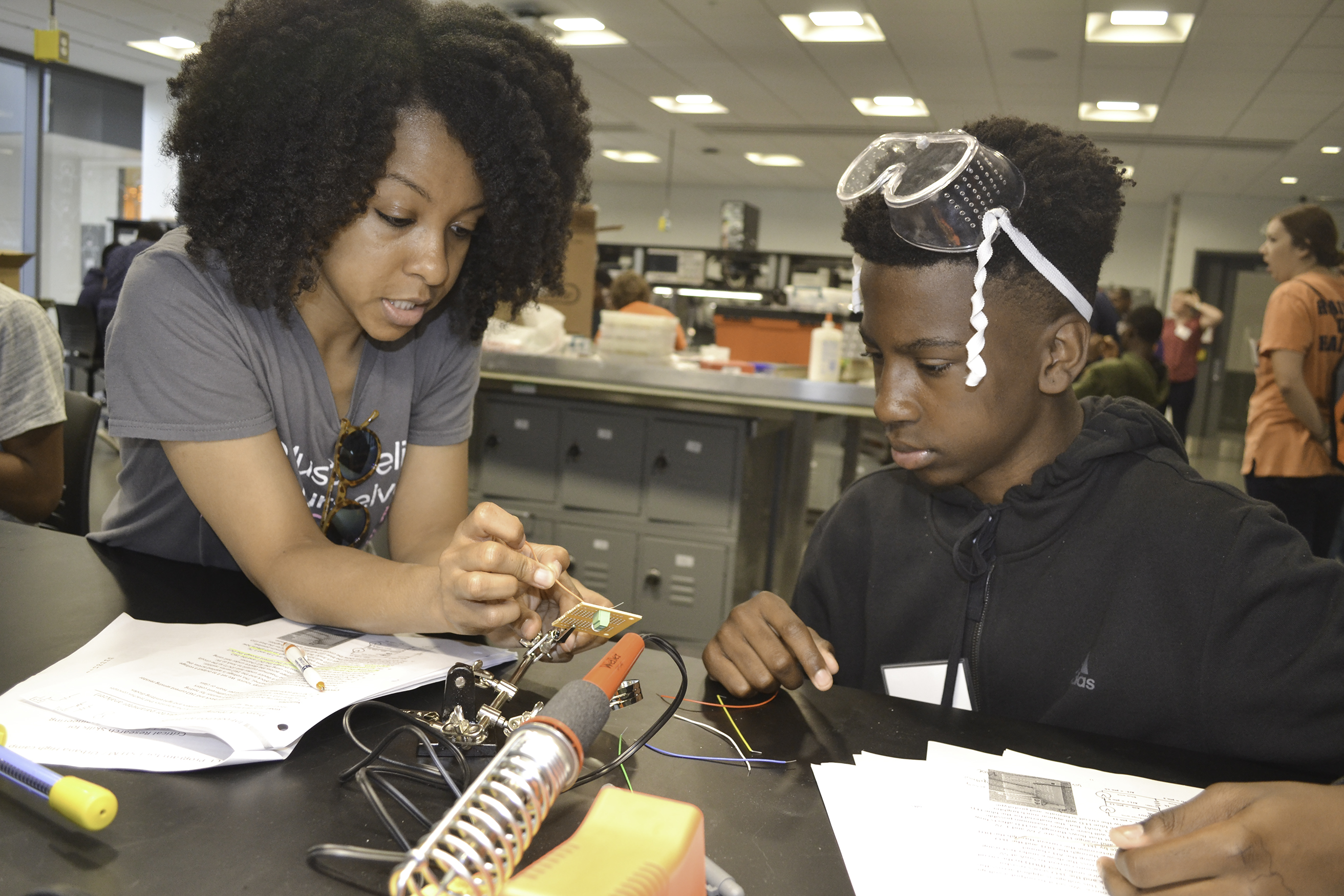
Lonna Edwards, an ECE grad student, helps a camper build a circuit.
“I love doing outreach. It's something I wish that I’d had when I was younger. I wasn't aware. I didn't know what an engineer was until I was starting college, and I learned about what they do, so I just picked it as a major, not really knowing much about it. It was a struggle in the sense that I had to maintain a certain GPA, so I was stressed out a lot of the time. But I made it, so I made it a goal to expose people earlier.”
Edwards says it’s a good idea to bring high school kids into a lab early. “The earlier the better,” she says. “But kids who get to experience this are at an advantage, because they're learning about things I didn't learn until I got to college. I tell them not to feel bad if they feel like they're not getting something, I tell them that they're still ahead of the game.”
“The earlier you get exposed, the better you'll be at it, because it won't be as stressful, and because it's something you've seen before,” she adds. “You'll be able to learn it and be confident. So I wanted to reach out to kids who are younger so they get that exposure, especially kids that are under-represented in the field. That's my main reason for doing it.”
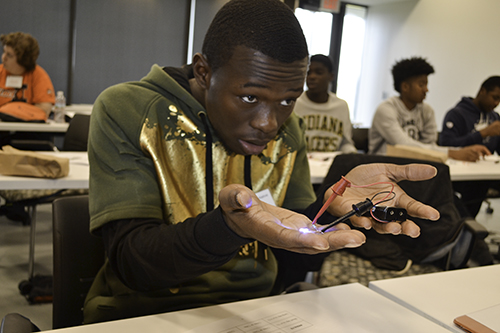
A camper gets his LED light to light up during a hands-on activity.
In addition to exposing underrepresented students, Edwards likes to participate in events like I-STEM’s camp because she just plain likes teaching.
“I feel like a lot of people think that engineering, math, and physics is hard. It's difficult, but I think that it's all in how someone teaches it to you. Somebody can explain it to you in simple terms, because anything can be broken down into simple terms. Then, you see that it's not too hard, and it makes you want to do it. I kind of want to motivate kids and say that “It's not too bad. It's hard to the outside world, but really, I know this trick!’
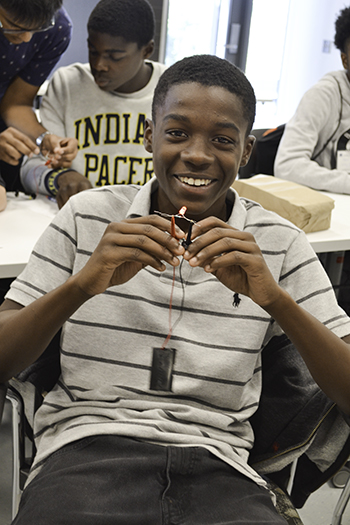
A UHS student proudly exhibits the glowing LED light during a hands-on activity.
Author/Photographer: Elizabeth Innes, Communications Specialist, I-STEM Education Initiative
More: 8-12 Outreach, ECE, I-STEM Initiatives, STEM Pipeline, Summer Camp, Underserved Students/Minorities in STEM, Urbana High School, 2017
For additional articles about I-STEM's 2017 Summer Camp, see:
- I-STEM Multidisciplinary Summer Program Exposes UHS Athletes to Different STEM Departments/Units
- MCBees Use “Whodunit?” to Pique UHS Students’ Interest in Science During I-STEM Summer Camp
- MNTL Day Exposes UHS Students to Nanotechnology Research During I-STEM’s Summer Multidisciplinary Camp
- Akono and Company Teach UHS Students About Civil Engineering and Strength of Materials During I-STEM’s Multidisciplinary Summer Camp
- Math Day at I-STEM’s Multidisciplinary Summer Camp Adds Up to Fun
- During I-STEM Summer Camp, Urbana High School Students’ Understanding of Aerospace Engineering Soars
- UHS Students Explore Computer Science, Coding, During I-STEM Camp’s CS Day
- At I-STEM's Multidisciplinary Summer Camp, UHS Students Have Fun with Chemistry—Everything From Soap Making To Glow Sticks to Ice Cream
- UHS Students Gear Up for Mechanical Science and Engineering During I-STEM Summer Camp
- During I-STEM Camp’s NCSA Day, UHS Students Experience Data Visualization, Super Computers, and NCSA’s Research
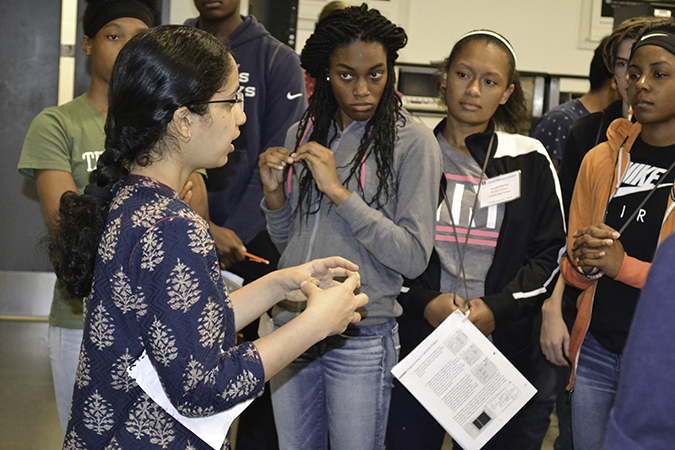
Aditi Udupa talks to the UHS students during their visit.













.jpg)
















